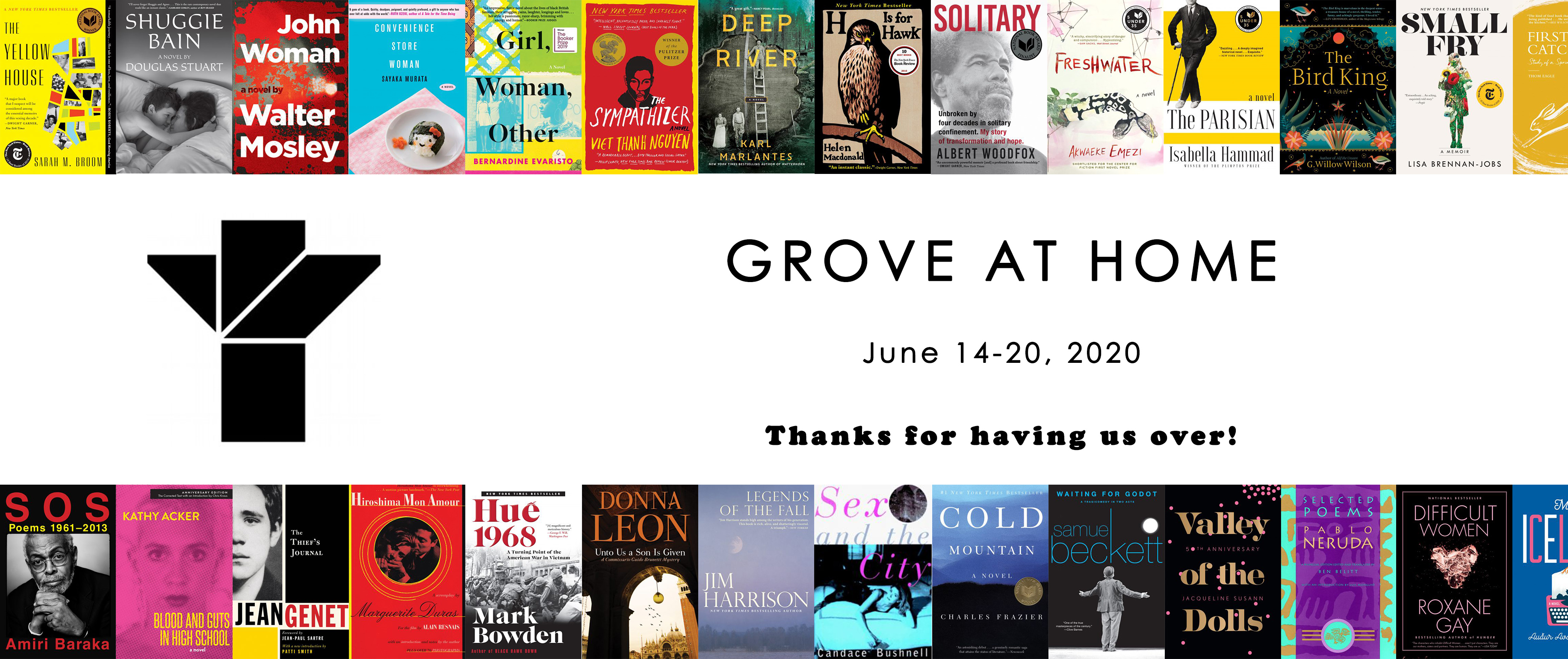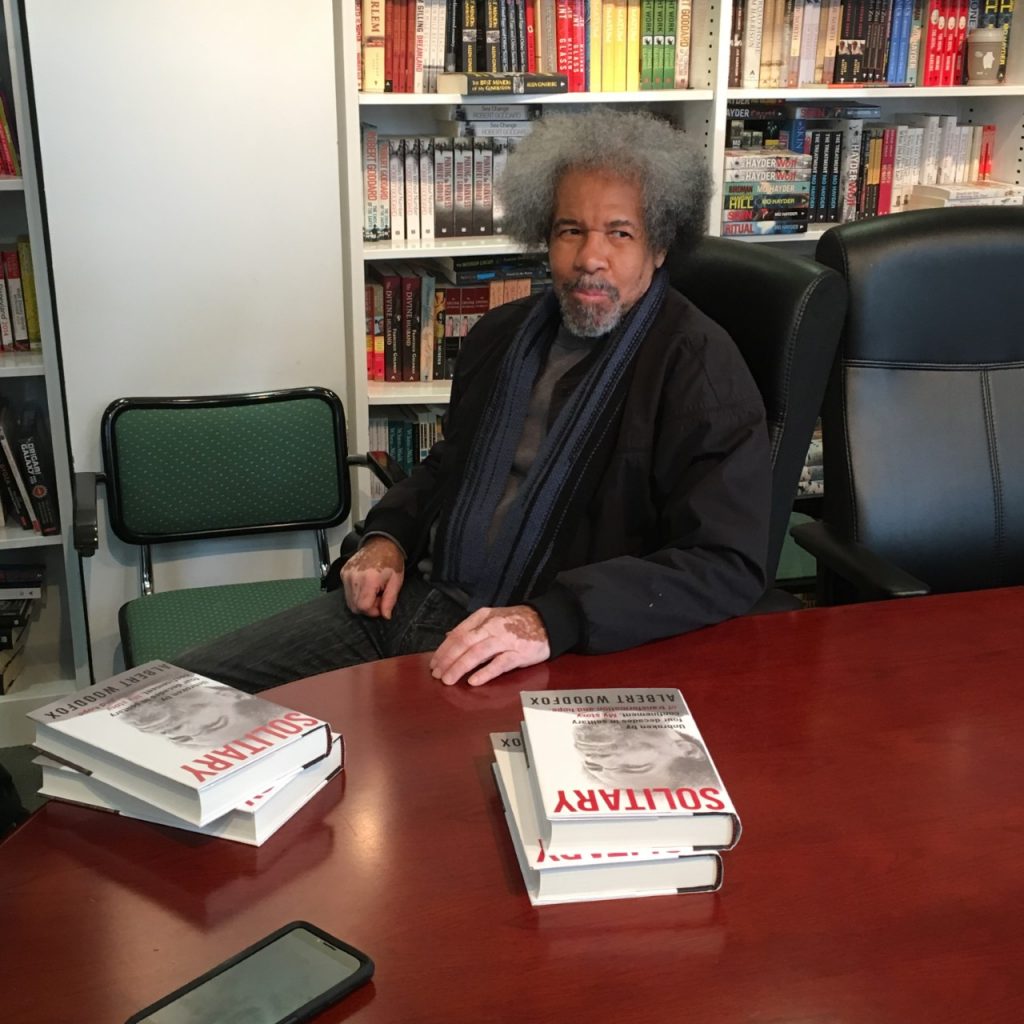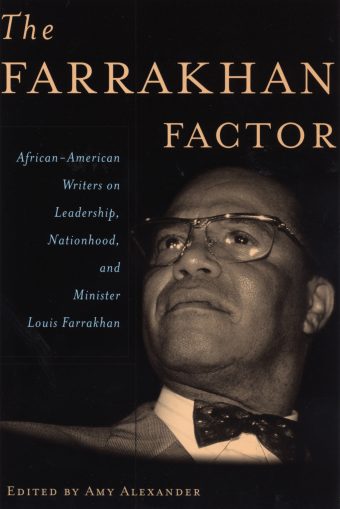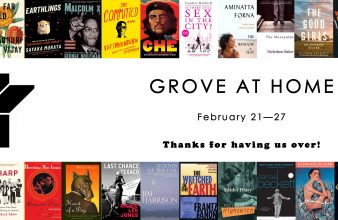News Room
Welcome to Grove at Home!
Every weekday, from now until we’re all out of the house again, we’ll be sharing a couple of links — some fresh, some from the vault — to say hi, remind you to keep reading, and let you know what’s on our minds.
Friday, June 19
Claudia Rankine: “Stop and Frisk”
Claudia Rankine may be the most admired poet in America. One of our key intellectuals, she unrelentingly produces a vision of society in which irreducible social complexities, so often overlooked, are confronted head-on. With her husband, filmmaker John Lucas, she also makes what she calls “situation videos” of her poems, juxtaposing her texts with sometimes stark imagery. Here’s a video for Rankine’s poem “Stop and Frisk,” which has grown only more relevant since it was released in 2014.
Albert Woodfox speaks to The Millions about his forty-plus years in solitary confinement
Albert Woodfox is an extraordinary human being. After surviving more than forty years in solitary confinement for a crime he didn’t commit, Woodfox, a Black Panther Party member and committed activist, emerged intact, and wrote an extraordinary memoir, Solitary, sharing his life story, and describing in astonishing detail his experiences being subject to a form of punishment that the United Nations has declared a form of torture and banned for stretches exceeding fifteen days. The book has been named a finalist for the Pulitzer Prize and the National Book Award. Last fall, Albert gave a short interview with writer Marie Myung-Ok Lee, which appears in Lee’s longer story about the crucial importance of literature on incarceration. It’s worth reading, today or any day.
“TM: What was the most difficult part of being in solitary?”
“AW: I couldn’t go to my mother’s funeral. They don’t let people in solitary out even for that. First thing I did when I got out was have my brother drive me to the cemetery, and because of a delay in my processing, it was closed. The next day, we went to a store and bought out all the flowers and I brought them to my mother’s grave.” Continue reading…
“Trane is a mature swan whose wing span was a whole world”
Today is Juneteenth, and it’s a good time to listen to John Coltrane’s “Alabama,” a wrenching meditation on the struggle for racial justice in America, written in response to the September 1963 bombing of the Sixteenth Street Baptist Church in Birmingham, Alabama, and performed here with legendary pianist McCoy Tyner, who passed away this spring. Gil Scott-Heron, in his song “Lady Day and John Coltrane,” sings:
Plastic people with plastic minds
Are on their way to plastic homes
No beginning, there ain’t no ending
Just on and on and on and on and on
It’s all because they’re so afraid to say that they’re alone
Until our hero rides in, rides in on his saxophone
Could you call on Lady Day?
Could you call on John Coltrane?
Now, ’cause they’ll wash your troubles
Your troubles, your troubles, your troubles away
The poet Amiri Baraka once wrote, “Trane is a mature swan whose wing span was a whole world. But he also shows us how to murder the popular song. To do away with weak Western forms. He is a beautiful philosopher.”
Thursday, June 18
“Trying to connect Black identity”: The Bronx reads Emily Raboteau
If the New York City Borough of the Bronx were its own city, it would be the eighth-largest in the US. Every week, the One Book One Bronx book club convenes to give Bronxites a chance to read, and think through that reading, together. These days, the meetings happen remotely via Zoom, but just a few months ago, in January, when New Yorkers gathering in rooms was still a thing, a few dozen people came together to discuss Emily Raboteau’s Searching for Zion, and the Bronx’s public access TV network, BronxNet, came by to get a look at the scene, talk to organizer Ron Kavanaugh, and generally cover the story.
Louis Farrakhan is back in the news
The Nation of Islam’s Louis Farrakhan is the news again — not for anything new he said, but because a small cluster of celebrities, including The Good Place actor Jameela Jamil and Interstellar star Jessica Chastain, recently tweeted out clips of the Minister speaking about racism on Donahue in 1990. The ensuing response, which saw many decrying Farrakhan’s statements about Jewish, gay, and transgender people until the celebrities deleted their posts, made clear that Farrakhan, who turned eighty-seven last month, remains as enigmatic and contradictory a figure as ever. Seems like a good time to read The Farrakhan Factor, the landmark 1999 collection of essays on Farrakhan edited by journalist Amy Alexander, with contributions from leading Black intellectuals including Henry Louis Gates, Jr.; Gwendolyn Brooks; Michael Eric Dyson; Julianne Malveaux; Stanely Crouch; and many others.
“Jamil appeared to share the clip first, captioning it: ‘Someone please tell me the name of this extraordinary man who so perfectly sums up white fear in under a minute.’
“Chastain re-shared the clip in her Instagram story soon after, while Handler posted the clip on her main Instagram, captioning it: ‘I learned a lot from watching this powerful video.’” Continue reading…
“Now he’s livin’ in the bottle”
It’s nearly the weekend. We’re all getting through. Take a few minutes to enjoy Gil Scott-Heron’s The Bottle — with a dark message about alcoholism that’ll make you think, and a driving groove that’ll carry you through the day.
Wednesday, June 17
Yesterday, we told you Pulitzer Prize winner Viet Thanh Nguyen was going to live-tweet Spike Lee’s Da 5 Bloods. He did.
He may not have gotten around to drinking as much Cognac as expected, but the peerless Viet Thanh Nguyen, author of The Sympathizer, did bring a remarkably knowledgeable, sympathetic perspective to bear in watching Spike Lee’s new movie, steeped in its own vision of US-Vietnamese history, and the thread of his tweets is a lesson in critical aesthetics, media representation, and racial discourse. As Nguyen observes, the movie takes place in a context where “the American Vietnam War Movie genre, as the critic Renny Christopher points out, posits the war as a civil war in the American soul. The Vietnamese are just bystanders.” Click the tweet below to open the full thread.
Here we go with my live tweeting of Spike Lee’s #Da5Bloods. I’m an admirer of many of Lee’s movies. I’m also someone who has seen almost all Hollywood movies about the Vietnam War. It’s an exercise I recommend to no one.
— viet thanh nguyen (@viet_t_nguyen) June 16, 2020
Josephus Daniels’s descendents remove his memorial in Raleigh, NC
Josephus Daniels was many things: a successful, even legendary, newspaperman; a wartime Secretary of the US Navy; a US Ambassador to Mexico — and an avowed, lifelong, dyed-in-the-wool white supremacist, who played an integral role in the murderous, racist coup that in 1898 took hold of Wilmington, North Carolina, then the state’s largest city, and one of its most racially mixed. (If that date sounds historically remote, consider that Daniels lived through World War II and remained a public figure for much of the twentieth century.) Daniels is one of the key players in David Zucchino’s remarkable history of that coup, Wilmington’s Lie. This week, Daniels’s descendants, still involved with the Raleigh News & Observer, decided to have a large statue of Daniels removed from downtown Raleigh. Here’s footage of the statue coming down:
And here’s the News & Observer’s coverage of the removal of the statue, which looks to Zucchino’s book to situate Daniels and his legacy in the history of the coup:
“Throughout the summer and fall of 1898, Zucchino wrote, Daniels had run ‘race-baiting editorials and newspaper cartoons and sensational, fabricated news stories’ to generate fear and anger toward Blacks.” Continue reading…
David Zucchino on North Carolina’s 1898 white supremacist coup
In early February, not too long before most of America went into lockdown, David Zucchino appeared at the US National Archives to discuss the the bloody Wilmington coup of 1898. He addresses, among many other things, the nineteenth-century campaign of what we today would call “fake news” that led up to the murderous uprising, the utter failure for decades of many official histories to reckon honestly with what had happened, and the continuing legacy of some of the very architects of that violence in places of honor in North Carolina today — including on the University of North Carolina campus, where, he explains, students have identified at least thirty buildings today named after white supremacist leaders. Zucchino’s account of the coup, Wilmington’s Lie, is a searing piece of too-little-known history whose urgency in the face of contemporary events can hardly be overstated.
Tuesday, June 16
Malcolm X on riots, “Blood Brothers,” and more
In this lightly-edited collection of comments, Malcolm X offers his plainspoken, militant analysis on a number of issues that were current in the mid-1960s and that remain, astonishingly, current today. “Whereas twenty years ago, when you have a little race riot, it was confined to a community. Today, if you have any kind of racal explosion, it will engulf the entire city, and it will have a chain-reaction effect of spreading from city to city, and on an international scale from country to country. And I for one would not like to see it happen.”
Viet Thanh Nguyen will live-tweet Spike Lee’s new movie this afternoon
Spike Lee’s new movie, Da 5 Bloods, is already being hailed as a “a lobbed grenade” (Rolling Stone) and “an immersive… tapestry” (Chicago Sun-Times). It’s a complicated work that delves deeply into a number of topics — the legacy of America’s military involvement in Vietnam key among them. Today at 4pm PST, Vietnamese-American writer Viet Thanh Nguyen, author of the Pulitzer Prize-winning The Sympathizer, will watch and live-tweet the movie. Aaron Robertson has the story at Literary Hub.
“Author Viet Thanh Nguyen will be offering his own take on the movie tonight as he live tweets his reactions (and sips some cognac). ‘As a professional Vietnamese,’ Nguyen joked, ‘I feel like I have to.’” Continue reading…
Olympia Vernon talks at Valdosta State
“My process is very dangerous. I don’t eat for days when I’m writing. I usually get a vision. I don’t use notecards or anything because I think when you try to map it out like that you piss off your characters. It’s like you’re telling them what to do.” This is part of what Olympia Vernon revealed to an audience of students at Georgia’s Valdosta State University when she appeared there in 2012. She also explained what makes a real writer (hint: it’s not about getting published), addressed the danger of pissing off your characters, and read from her Ernest J. Gaines Award-winning novel A Killing in this Town, a breathtaking story set in the Klan-menaced American South.
Monday, June 15
A word from Lauren Francis-Sharma
This week, conscientious voices across the book world are coming together to urge readers to buy two books each by Black authors. A terrific idea — we’ll let Lauren Francis-Sharma, author of the “satisfying and perceptive… masterly epic” (Publishers Weekly) Book of the Little Axe, explain it from here:
Let’s do this. Buy two books by Black authors this week. It’s been challenging to launch a book during these crises we’re facing so if one is BOOK OF THE LITTLE AXE, I’d be thrilled. https://t.co/SP1Xbqh513
— Lauren FrancisSharma (@laurenfsharma) June 14, 2020
A word from Jill Watts
Dr. Jill Watts, author of The Black Cabinet, is also encouraging support for Black authors this week. Buy Black authors’ books. Read Black authors’ writing. Contemplate Black authors’ ideas. Celebrate Black authors’ success. Absolutely.
Buying books? Here’s great recommendations from @blackmenreadnow for independent Black booksellers to support. https://t.co/iJ7CWOtTz9
— Jill Watts (@jillmwatts) June 15, 2020
A word from Roxane Gay
Oh, and did we mention Roxane Gay is taking part?
— roxane gay (@rgay) June 14, 2020










